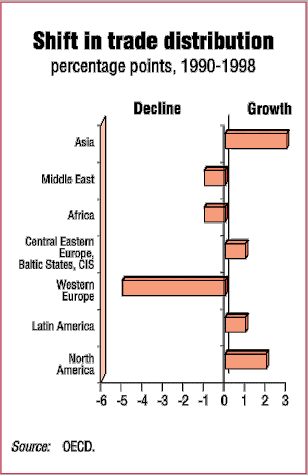|
|
|
|

Focus—Millenium Trade Round
Notes for a Development Round
by Jean-Marie Metzger

Trade liberalisation promises big returns for all countries, regardless of their stage of development. The interests of non-OECD countries have been considered particularly important for the success of this round, such that it has come to be known in some circles as the Development Round.
Whether measured as a percentage of GDP or in terms of welfare gains, the benefits of trade liberalisation are potentially very large. Simulations made at OECD indicate that by 2010, assuming a full and global liberalisation of tariffs alone, net world welfare could be around US$1,200 billion higher (in 1995 prices) than it would be if current levels of tariff protection remained unchanged. This is equivalent to a 3% gain in world GDP.
The estimated gains as a share of GDP are highest in the case of India (9.6%), and the benefits to China are also substantial, representing a 5.5% gain in its GDP. The study's simulations further show that Sub-Saharan African countries as a group stand to improve their GDPs by 3.7%, a prospect that could lift the region out of chronically low growth rates. This implies annual gains of US$11 billion an amount almost equivalent to official development assistance to Africa in 1997 (US$11.37 billion) from OECD countries. Furthermore, the study shows that regardless of the size of country economies, trading in international markets within a framework of strong rules and disciplines agreed through multilateral (as opposed to bilateral) negotiations promises even more benefits. This is because multilateral rules "level the playing field", for large and small economies to compete on a similar footing. Also, the relatively smaller size of developing countries' markets, and hence their relatively larger reliance on export-led growth, is coupled with the fact that they enjoy comparative advantage in a narrower range of goods and services. This means that they have a proportionately larger stake in a healthy growing world economy than do industrial countries.